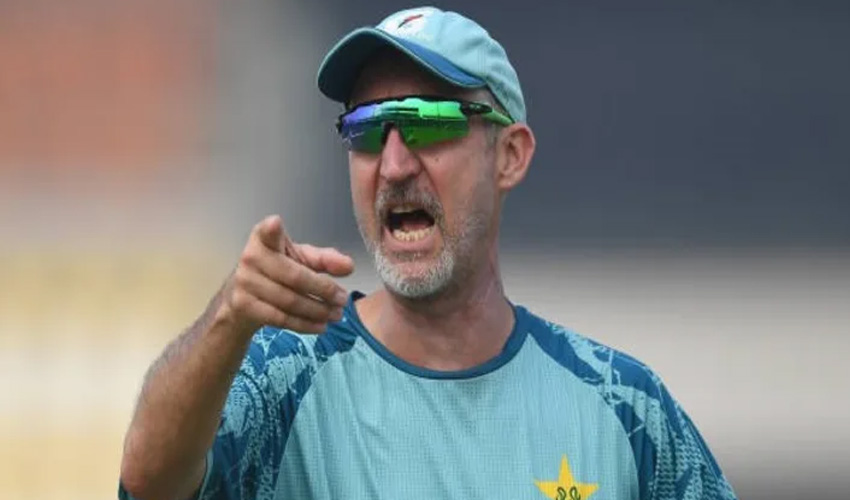Sports
Gillespie Reveals Shocking Reasons for Sudden Exit as Pakistan Coach

Former Australian all-rounder Jason Gillespie has shed light on the circumstances that led to his resignation as Pakistan’s red-ball head coach, citing poor communication and a diminishing sense of purpose in his role.
In an interview with Australian media, Gillespie opened up about the frustrations he faced during his tenure with the Pakistan cricket team, including his exclusion from key decisions by the Pakistan Cricket Board (PCB).
Lack of Communication from PCB
Gillespie expressed dissatisfaction with the PCB’s handling of crucial matters, particularly their decision to let go of High-Performance Coach Tim Nielsen without informing him.
“I was completely unaware of the decision not to retain Tim Nielsen,” Gillespie revealed. “This, along with several past issues, made me question whether I was truly needed. Not informing the head coach about such a significant decision compelled me to reconsider my position.”
He also lamented the lack of coordination, stating that he often learned about major decisions, such as squad changes and committee formations, via impersonal updates or group chats.
Fading Purpose in the Role
Gillespie highlighted how his role had been reduced to menial tasks, such as conducting catching practice on match mornings, which led him to feel his contributions were undervalued.
“The purpose of my coaching stint in Pakistan was fading away,” he said. “I was reduced to giving catching practice to players on match mornings.”
As the head coach, he emphasized the importance of clear communication for effective team planning. “It’s essential to have full communication with selectors and other stakeholders. Without being informed about squad plans or decisions a day in advance, it becomes nearly impossible to function properly,” he added.
Key Incidents That Triggered His Decision
Gillespie recounted several incidents that underscored his frustration, including being excluded from discussions about the new selection committee. He learned of its formation via a text message after Pakistan’s first Test against England.
Another contentious issue was the decision to drop Pakistan’s star batter, Babar Azam, during the Test series against England. The move was made by the new selection committee without consulting him. “The decision to drop Babar Azam was made without my input,” Gillespie remarked, calling it a glaring example of the disconnect between the board and the coaching staff.
Mixed Tenure and Sudden Departure
Gillespie’s resignation came after an eventful, albeit short, stint. Appointed on April 28, 2024, his tenure began with a 2-0 Test series loss to Bangladesh at home. However, the team rebounded under his guidance to secure a 2-1 Test series victory against England.
Despite these achievements, Gillespie expressed frustration with the PCB’s internal inefficiencies. “After being sidelined from selection matters, my powers were severely limited. How could I plan for matches when I wasn’t consulted on squad decisions or even informed about key player exclusions like Babar Azam?” he questioned.
Praise for Pakistan’s Talent, Criticism for PCB
Although critical of the PCB, Gillespie praised the immense talent within the Pakistan team, stating that the players had great potential to succeed on the global stage.
The decision not to renew Tim Nielsen’s contract was another point of contention for Gillespie. Nielsen, appointed in August 2024, was informed his services were no longer required after Pakistan’s tour of Australia, despite his efforts to continue contributing to the team.
Interim Coach Appointed
Following Gillespie’s departure, the PCB named former fast bowler Aqib Javed as interim head coach. Javed will lead Pakistan in their upcoming two-match Test series against South Africa, scheduled to take place from December 20, 2024, to January 7, 2025, in Centurion and Cape Town.
Gillespie’s exit has left questions about the PCB’s management practices and the future stability of the coaching setup within Pakistan cricket.
Sports
Virat Kohli Confronts Australian Journalist Over Family Privacy

Indian cricket star Virat Kohli engaged in a heated exchange with an Australian journalist in Melbourne on Friday, ahead of the Boxing Day Test against Australia, over concerns about his family’s privacy.
The incident occurred at the airport when Kohli noticed video cameras pointed in the direction of his children, leading him to believe they were being filmed without his consent.
Known for fiercely guarding his family’s privacy, Kohli confronted a journalist from Channel 7, saying, “With my kids, I need some privacy. You can’t film without asking me.”
Channel 7 reporter Theo Doropoulos later clarified that the situation arose from a misunderstanding, as Kohli assumed the cameras were focused on his family. Despite this, Kohli’s frustration was evident as he firmly reiterated his stance on maintaining boundaries with the media.
The incident underscores Kohli’s unwavering commitment to protecting his family from media intrusion, especially his children, as he balances public life with personal responsibilities.
Sports
Saim Ayub Becomes Youngest to Score Century Against South Africa in a Chase

Saim Ayub etched his name in history by becoming the youngest player to score a century against South Africa while chasing, achieving the milestone at 22 years and 207 days in 2024.
Breaking records, Ayub surpassed Quinton de Kock, who previously held the title for the youngest to score a century in South Africa during a chase at 23 years and 48 days in 2016.
Ayub now ranks as the third youngest player overall to score a century against South Africa in ODIs, following Ahmed Shehzad (22 years, 4 days) and Kane Williamson (22 years, 167 days).
This remarkable achievement showcases Ayub’s immense talent and promises a bright future for the young star, as fans eagerly await his next performances on the international stage.
Sports
Mohammad Amir Announces Retirement from International Cricket Again

Pakistan’s star fast bowler Mohammad Amir has announced his retirement from international cricket following Pakistan’s disappointing performance at the T20 World Cup earlier this year.
The 32-year-old cricketer made the announcement on X (formerly Twitter), stating, “After careful consideration, I have taken the difficult decision to retire from international cricket. These decisions are never easy, but they are inevitable.”
Amir emphasized that it was time for the next generation to step up, saying, “I feel this is the right time for the next generation to take the baton and elevate Pakistan cricket to new heights.”
Reflecting on his career, Amir expressed pride in representing his country, calling it “the greatest honour of my life.” He also extended his gratitude to the Pakistan Cricket Board (PCB), his family, friends, and fans for their unwavering support.
Earlier in the year, Amir had reversed his retirement and was brought back into the squad for the T20 World Cup, held jointly in the Caribbean and the United States. However, Pakistan’s campaign ended in disappointment after losses to the US and India in the group stage, contributing to Amir’s decision to step away from international cricket once again.
-

 Sports1 week ago
Sports1 week agoIsa Guha’s Comment on Bumrah Sparks Outrage, Apologizes
-

 Sports7 years ago
Sports7 years agoICC Chief Jay Shah Heads to Australia Amid Champions Trophy Controversy
-

 Sports7 years ago
Sports7 years agoSarfaraz Ahmed Reunites with ICC Champions Trophy in Karachi
-

 Sports7 years ago
Sports7 years agoPCB Appoints Tournament Director for ICC Champions Trophy 2025
-

 Politics7 days ago
Politics7 days agoAurangzeb states that protest politics is causing a staggering daily loss of Rs190 billion.
-

 Politics7 years ago
Politics7 years agoAttaullah Tarar accuses PTI of favoring a ‘politics of violence.’
-

 Sports7 days ago
Sports7 days agoBabar Azam Breaks Record as Fastest to 11,000 T20 Runs
-

 Sports5 days ago
Sports5 days agoSaim Ayub Becomes Youngest to Score Century Against South Africa in a Chase





